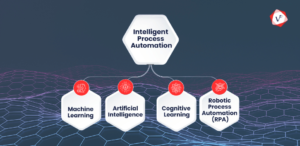Quick Answer
Intelligent Process Automation (IPA) combines AI, Machine Learning, and Robotic Process Automation to automate complex business processes, reduce costs by 30-50%, and improve efficiency while making intelligent decisions without human intervention.
Table of Contents
What is Intelligent Process Automation (IPA)?
At its core, Intelligent Process Automation (IPA) is a method for streamlining business tasks by combining Artificial Intelligence (AI), Machine Learning (ML), and Robotic Process Automation (RPA). These advanced technologies work together to handle repetitive, rule-based tasks and even complex decision-making processes. Here’s how each part of IPA contributes:

- Artificial Intelligence (AI): AI helps machines understand, learn, and make decisions. This includes understanding patterns, analyzing data, and making predictions, which is essential for intelligent decision-making.
- Machine Learning (ML): ML is a branch of AI that helps systems get better at tasks through experience. The more data they have, the better they perform, meaning systems can continuously improve without needing to be reprogrammed.
- Robotic Process Automation (RPA): RPA automates simple, rule-based tasks, like filling out forms, handling data entry, and sending emails. RPA performs tasks just as a human would, but faster and without errors.
- Cognitive Learning: Cognitive Learning uses advanced algorithms to simulate human thought processes, such as understanding language and recognizing patterns.
How Intelligent Process Automation Works?
Imagine a scenario where IPA is used to handle customer support. With traditional RPA, bots can automate actions like responding to emails or updating customer information in a database. But IPA takes this further by using AI and ML to analyze customer questions, identify patterns, and offer personalized responses. Here’s a breakdown of how IPA works in a typical setting:
- Collect Data: First, data is gathered from different sources, such as customer support chats, emails, and databases.
- Analyze and Process Data: AI tools then analyze this data to understand common customer issues, categorize them, and determine the best solutions.
- Make Decisions: Using machine learning, the system can make decisions based on past interactions and patterns. This helps it to handle new issues that may not have specific rules.
- Automate Actions: Once the system has all the information, it uses RPA to perform the necessary tasks, such as sending an email, updating a customer file, or processing a refund.
In essence, IPA enables systems to take actions that normally require human intelligence, like understanding language and making decisions based on previous experience. This frees up employees to work on more complex tasks that require creativity and critical thinking.
Why is Intelligent Process Automation Important?
IPA is quickly becoming essential for businesses that want to improve efficiency, save costs, and offer better customer experiences. Here are a few key benefits:
- Improved Efficiency: Since IPA automates repetitive tasks, processes happen much faster. This means fewer delays and faster results, which is especially important for tasks like customer support and claims processing.
- Better Accuracy: Humans make mistakes, especially when performing repetitive tasks. IPA, however, performs tasks accurately every time, reducing costly errors.
- Cost Savings: By automating tasks, companies can reduce the amount of time and resources needed to complete them. This leads to significant cost savings over time.
- Enhanced Customer Experience: IPA allows businesses to respond to customer needs more quickly and accurately. With automated systems in place, customers get faster service, which leads to higher satisfaction.
- Scalability: As a business grows, so do its needs. IPA solutions can easily be scaled to handle larger volumes of tasks, making it ideal for companies of any size.
Real-World Examples of IPA in Action
- Banking and Financial Services: In the banking sector, IPA can process loan applications, detect fraud, and manage compliance checks. For instance, banks can use IPA to scan documents for accuracy, check them against regulations, and approve loans faster. Fraud detection systems can use AI to spot suspicious transactions and flag them for further investigation.
- Healthcare: In healthcare, IPA assists in processing insurance claims, managing patient records, and scheduling appointments. For example, instead of manually checking insurance eligibility for each patient, IPA can verify details, process claims, and send updates, allowing healthcare providers to focus more on patient care.
- E-commerce and Retail: IPA helps e-commerce companies with inventory management, customer support, and order processing. By analyzing customer data, IPA can suggest products, automate order tracking, and provide personalized customer service, enhancing the shopping experience.
- Human Resources (HR): HR departments often have repetitive tasks, like screening resumes, scheduling interviews, and onboarding new employees. IPA can help filter through resumes, set up automated emails to candidates, and even assist new employees by providing automated answers to common questions.
Common Tools Used in IPA
Several tools are available to implement IPA in businesses. Here are some popular ones:
- UiPath: A popular RPA tool that supports the automation of various business tasks.
- Blue Prism: Known for its robust security features, it’s often used in industries where data protection is crucial.
- Automation Anywhere: This tool provides advanced AI and machine learning features, making it a strong choice for IPA.
- Microsoft Power Automate: It’s part of Microsoft’s Power Platform and integrates easily with other Microsoft applications, making it a popular choice for companies already using Microsoft tools.
- IBM Watson: Known for its powerful AI capabilities, IBM Watson is often used for complex data analysis and decision-making.
The Future of Intelligent Process Automation
The future of IPA looks promising as technology advances further. Here are some trends we may see:
- Greater AI Capabilities: AI and ML are constantly improving, which will make IPA systems even more intelligent and capable of handling complex tasks.
- More Industry-Specific Solutions: As IPA becomes more common, we may see more tailored solutions for specific industries like healthcare, retail, and finance.
- Improved Decision-Making: As IPA learns from more data over time, its ability to make better, data-driven decisions will only improve, benefiting businesses in more strategic ways.
- Expanded Use in Small Businesses: As IPA tools become more affordable, small businesses will start adopting IPA, benefiting from automation without breaking the bank.
Emerging Trends 2025-2030
1. Hyperautomation
- End-to-end process automation
- Integration of multiple AI technologies
- Automated process discovery and optimization
- Self-healing and self-improving systems
2. Advanced AI Integration
- Generative AI: Content creation and complex problem-solving
- Computer Vision: Advanced image and video processing
- Emotional AI: Understanding human emotions and responses
- Quantum Computing: Solving complex optimization problems
3. Industry-Specific Solutions
- Healthcare: Personalized treatment automation
- Finance: Regulatory compliance automation
- Manufacturing: Predictive maintenance and quality control
- Retail: Dynamic pricing and supply chain optimization
4. Democratization of Automation
- Citizen Developer Tools: Non-technical users creating automations
- Low-Code/No-Code Platforms: Simplified automation development
- AI-Assisted Development: AI helping design automation workflows
- Cloud-Based Solutions: Reduced barriers to entry
5. Ethical AI and Responsible Automation
- Explainable AI: Transparent decision-making processes
- Bias Detection: Automated identification and correction
- Human-AI Collaboration: Augmenting rather than replacing humans
- Sustainability: Energy-efficient automation solutions
Technology Predictions
By 2026:
- 90% of large enterprises will have some form of IPA implementation
- 50% reduction in traditional RPA deployments as IPA takes over
- Integration with IoT devices becomes standard
- Real-time decision-making becomes the norm
By 2028:
- Fully autonomous business processes in specific domains
- AI-driven process optimization without human intervention
- Cross-industry automation standards emerge
- Quantum-enhanced optimization algorithms
By 2030:
- Self-configuring automation systems
- Predictive automation that anticipates business needs
- Seamless human-AI workforce integration
- Automated compliance with evolving regulations
Conclusion
Intelligent Process Automation represents the next evolution of business process optimization, combining the precision of RPA with the intelligence of AI and ML. As organizations face increasing pressure to improve efficiency, reduce costs, and enhance customer experiences, IPA provides a comprehensive solution that delivers measurable results.
The technology has moved beyond simple automation to become a strategic enabler of digital transformation. With proven ROI, mature tools, and expanding capabilities, IPA is no longer a question of “if” but “when” and “how fast” organizations can implement these solutions.
Success with IPA requires careful planning, proper tool selection, and commitment to change management. Organizations that start their IPA journey today will be well-positioned to leverage emerging technologies like generative AI, quantum computing, and advanced analytics as they become available.
Key Takeaways:
- IPA combines RPA, AI, and ML for intelligent automation
- Average ROI of 200-400% within 12-18 months
- Best suited for high-volume, rule-based processes
- Requires a strategic approach and change management
- The future includes hyperautomation and autonomous processes
Next Steps:
- Assess current processes for automation opportunities
- Calculate potential ROI for priority use cases
- Select an appropriate IPA platform for your needs
- Develop an implementation roadmap and timeline
- Begin with a pilot project to prove value
The future of work is intelligent, automated, and augmented by AI. Organizations that embrace IPA today will lead their industries tomorrow.





